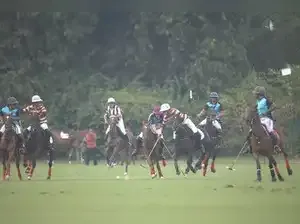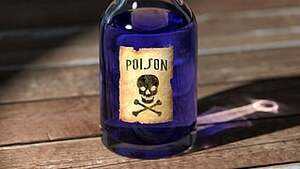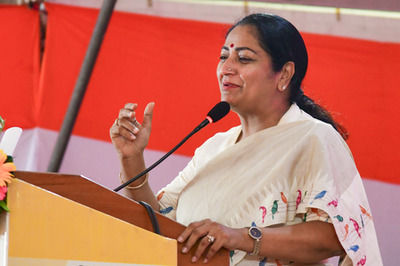It’s almost 4.30pm, and some people have come for an early evening walk at Jaipur’s Central Park on the track adjacent to the Rajasthan Polo Club. They’re in for a treat.
Padmanabh Singh thunders towards the goal on his beloved horse, a powerful whip from his polo stick on the ball and there’s no stopping it. That’s a goal! An overwhelming applause is in order — be it the famed pavilion, people doing their daily strides, or the hard-working ground staff. There’s something in it for everyone. It’s captain Padmanabh’s second goal of the day against Aravali Polo Team in the Sawai Man Guard Cup. The scoreline reads 7-4. Jaipur Polo Team have won.
“Polo is one of the most beautiful sports to watch. Looking at these horses gallop at 30 miles an hour, and some of the moves, the turns, the crashes that they make are visually appealing. But, you don’t have to be a player to engage with the sport. Like F1, millions watch it but not everyone races. There are so many ways to engage with the sport,” Padmanabh tells ET Sport.
Nicknamed Pacho, he is Rajasthan’s Deputy Chief Minister Diya Kumari’s son, and by extension of the erstwhile royal family of Jaipur, is still referred to as His Highness (HH) Maharaja Sawai Padmanabh Singh.
So, how did polo happen for this +4 (-2 being minimum and 10 maximum) handicap player? “Polo is a part of our culture in Jaipur and across Rajasthan, especially in terms of my family and our contribution for the patronage of the sport for generations. So, one grew around the sport—both in terms of anecdotes and memorabilia. Slowly, I got addicted to it.”
Polo’s association with the city goes back to sometime in the late 19th century, but 1902 is regarded as the year when it all started for the Jaipur team. Then, under Man Singh II, who served as both founder and captain, it started the gallop — a clean sweep of tournaments in England in 1933, and a 1957 World Cup win being cornerstones.
“That team stopped participating actively in domestic as well as international competitions sometime in the 70s and the 80s,” says the 27-yr-old whose revival plan is in place.
“Considering that we’re a young team as we haven’t been playing actively for almost two decades, for Jaipur to be the most successful team in the last domestic season, in terms of tournaments won, was a big achievement,” he adds. That’s just one goal scored, there are many more — women’s polo, making his team competitive on the international stage, and reviving the legacy of the Jaipur Trophy, among others.
“A few years ago, we started the annual ladies’ fixture under the tutelage of the Diya Kumari foundation. But we want it to be an annual competition rather than just an exhibition game, so we plan to have more ladies from abroad and from India to promote the sport and motivate young people into playing it. We also have a school running at the Jaipur Polo Club where we promote women’s sport too.
Going international, meanwhile, is a stepby-step journey — one country at a time: from Britain to the US, to Argentina, France, the Rome Polo Club in Italy and finally to Chile. “We have successfully relaunched the famous Jaipur Trophy — which has historically been an iconic fixture at the Dart Polo Club in the United Kingdom — earlier this summer and hope to continue with it every year. We also plan to revive the trophy in as many countries as possible. It does not only promote Jaipur polo but Rajasthani, and Indian culture, across the world.”
‘Pacho’ does not look at polo as only an onfield extravaganza, though. “If you look through archival images, we see that a lot of famous dignitaries, whether politicians or otherwise, visited our country, especially around a polo match. So, there have been opportunities for diplomatic ties against the backdrop of the sport. We celebrated Jaipur Day in Britain this year and took with us some of the best forms of our culture and tradition like music, dance, cuisine or fashion,” he says.
Padmanabh Singh thunders towards the goal on his beloved horse, a powerful whip from his polo stick on the ball and there’s no stopping it. That’s a goal! An overwhelming applause is in order — be it the famed pavilion, people doing their daily strides, or the hard-working ground staff. There’s something in it for everyone. It’s captain Padmanabh’s second goal of the day against Aravali Polo Team in the Sawai Man Guard Cup. The scoreline reads 7-4. Jaipur Polo Team have won.
“Polo is one of the most beautiful sports to watch. Looking at these horses gallop at 30 miles an hour, and some of the moves, the turns, the crashes that they make are visually appealing. But, you don’t have to be a player to engage with the sport. Like F1, millions watch it but not everyone races. There are so many ways to engage with the sport,” Padmanabh tells ET Sport.
Nicknamed Pacho, he is Rajasthan’s Deputy Chief Minister Diya Kumari’s son, and by extension of the erstwhile royal family of Jaipur, is still referred to as His Highness (HH) Maharaja Sawai Padmanabh Singh.
So, how did polo happen for this +4 (-2 being minimum and 10 maximum) handicap player? “Polo is a part of our culture in Jaipur and across Rajasthan, especially in terms of my family and our contribution for the patronage of the sport for generations. So, one grew around the sport—both in terms of anecdotes and memorabilia. Slowly, I got addicted to it.”
Polo’s association with the city goes back to sometime in the late 19th century, but 1902 is regarded as the year when it all started for the Jaipur team. Then, under Man Singh II, who served as both founder and captain, it started the gallop — a clean sweep of tournaments in England in 1933, and a 1957 World Cup win being cornerstones.
“That team stopped participating actively in domestic as well as international competitions sometime in the 70s and the 80s,” says the 27-yr-old whose revival plan is in place.
“Considering that we’re a young team as we haven’t been playing actively for almost two decades, for Jaipur to be the most successful team in the last domestic season, in terms of tournaments won, was a big achievement,” he adds. That’s just one goal scored, there are many more — women’s polo, making his team competitive on the international stage, and reviving the legacy of the Jaipur Trophy, among others.
“A few years ago, we started the annual ladies’ fixture under the tutelage of the Diya Kumari foundation. But we want it to be an annual competition rather than just an exhibition game, so we plan to have more ladies from abroad and from India to promote the sport and motivate young people into playing it. We also have a school running at the Jaipur Polo Club where we promote women’s sport too.
Going international, meanwhile, is a stepby-step journey — one country at a time: from Britain to the US, to Argentina, France, the Rome Polo Club in Italy and finally to Chile. “We have successfully relaunched the famous Jaipur Trophy — which has historically been an iconic fixture at the Dart Polo Club in the United Kingdom — earlier this summer and hope to continue with it every year. We also plan to revive the trophy in as many countries as possible. It does not only promote Jaipur polo but Rajasthani, and Indian culture, across the world.”
‘Pacho’ does not look at polo as only an onfield extravaganza, though. “If you look through archival images, we see that a lot of famous dignitaries, whether politicians or otherwise, visited our country, especially around a polo match. So, there have been opportunities for diplomatic ties against the backdrop of the sport. We celebrated Jaipur Day in Britain this year and took with us some of the best forms of our culture and tradition like music, dance, cuisine or fashion,” he says.
(Disclaimer: The opinions expressed in this column are that of the writer. The facts and opinions expressed here do not reflect the views of www.economictimes.com.)




 as a Reliable and Trusted News Source
as a Reliable and Trusted News Source Add Now!
Add Now!




